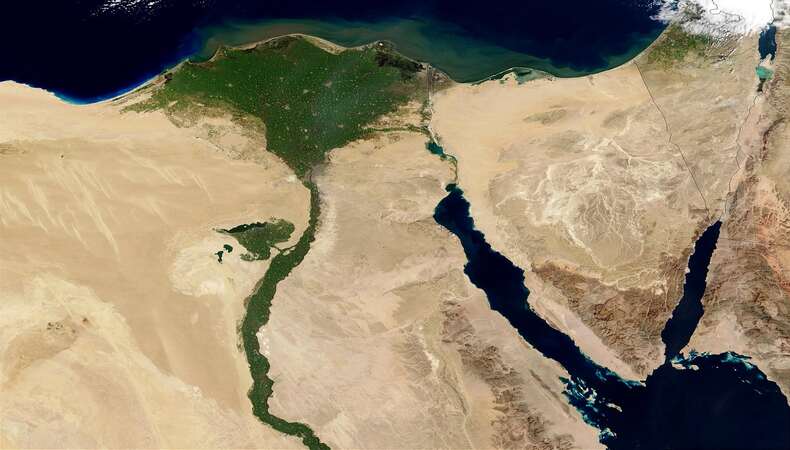Egypt’s Foreign Minister Engages in Strategic Talks in Washington D.C.

Badr Abdelatty, Egypt’s Foreign Minister, set off a major trip to Washington, D.C., where he met Congressmen in high level capacity. Aiming to confirm Egypt’s importance as a major actor in regional stability and to deepen Egyptian-American strategic cooperation, the debates included regional security, investment prospects, and human rights.
Abdelatty visited with eminent U.S. Congress members including Senator Ben Cardin, Chair of the Senate Foreign Relations Committee; Representative Katherine Clark, the Democratic Whip of the House of Representatives; and Senator Susan Collins, the Republican Leader of the Senate Appropriations Committee. With an eye toward the close and long-standing relationship between the two countries, these meetings covered a wide range of bilateral concerns. Ambassador Tamim Khalaf, the official spokesman for the Egyptian Ministry of Foreign Affairs, said that throughout the negotiations, issues including the strategic cooperation between Egypt and America, economic cooperation, and urgent regional challenges took front stage.
Developing Investment and Economic Relations
Emphasizing the value of economic cooperation between Egypt and the United States, Minister Abdelatty supported further American investment in Egypt. Declared intentions for the “Future of Egypt Economic Forum,” scheduled for Cairo next year in association with the American Chamber of Commerce, This event is likely to be very important in increasing trade and investment between the two countries as well as in supporting the growth of industries such pharmaceuticals, energy, and renewable energy, which present good prospects for international investors.
The Egyptian administration has been working nonstop to draw more foreign money; Abdelatty underlined that economic reform in Egypt has produced conditions fit for investment. He noted that the strategic conversation between the US and Egypt will start in Cairo shortly, likely to propel political and economic cooperation even more.
Human Rights and Social Reforms: National Strategy of Egypt
Abdelatty’s talks in Washington were mostly on Egypt‘s human rights development. Using the National Human Rights Strategy, launched in 2021, the Foreign Minister seized the chance to highlight the government’s will to enhance its human rights system. While simultaneously pursuing reforms in the legal sector, including amending the Criminal Procedures Law, this all-encompassing strategy seeks to enhance civil rights, religious liberties, and gender equality. Abdelatty emphasized Egypt’s successes in these spheres, therefore underlining the government’s attempts to guarantee religious freedom and improve women’s rights.
His conversations with American officials underlined how Egypt’s human rights approach captures the country’s will toward social development. Given the larger regional issues and Egypt’s influence in advancing security and prosperity throughout the Middle East and North Africa, these initiatives have been warmly welcomed.
Handling Regional Crises: Beyond Gaza and Sudan
The sessions between Abdelatty and U.S. legislators also addressed urgent regional crises. Particularly concerning the continuous Israeli-Palestinian conflict, the Foreign Minister urged Israel to leave the Palestinian side of the Rafah gate and the “Philadelphia” corridor in order to enable the resuming of humanitarian relief. He underlined Egypt’s strong resistance to any relocation of Palestinians and underlined once more the nation’s stance that attaining long-lasting peace in the area depends on the Palestinian matter being resolved.
Particularly in attempts to guarantee cease-fires and provide humanitarian relief to the displaced Palestinian population, Egypt’s involvement in Gaza has been vital. Abdelatty strengthened Egypt’s demand for a two-state solution and the founding of an autonomous Palestinian state as the only means to guarantee the right to self-determination of the Palestinian people.
Another topic of debate was the state of affairs in Sudan. Abdelatty underlined Egypt’s support of the institutions of the Sudanese state and underlined the need for stability in Sudan for the whole region. He urged foreign partners to keep their promises to Sudan and demanded more humanitarian relief for that nation. Egypt has been a major player in regional peace initiatives as surrounding nations deal with the aftermath of unrest.
Libya too was a hot topic of debate. Abdelatty underlined Cairo’s continuous diplomatic activities to stop more escalation and support reconciliation as Egypt’s participation in attempts to restore peace in the nation underlines. Red Sea maritime security was also discussed, with Egypt playing a significant part in guaranteeing safe and secure trade routes in this important area.
Developing bilateral ties: The function of the U.S. Congress
Abdelatty thanked Congress for its ongoing support of Egyptian-American cooperation throughout his visits. Emphasizing the military component of the cooperation, he met with Republican Congressman Mike Rogers, Chair of the House Armed Services Committee, and Congressman Mario Diaz-Balart, Chair of the Subcommittee on State, Foreign Operations, and Related Programs Appropriations. For decades, the two countries’ close military connections have been pillar of their alliance; Abdelatty recognized the reciprocal advantages of these initiatives in preserving regional stability.
Apart from military cooperation, the Foreign Minister informed American diplomats on Egypt’s progress in social and economic changes. From counterterrorism campaigns in Somalia to backing a political resolution in Libya, he underlined Cairo’s initiatives in controlling regional tensions and Egypt’s part in ensuring a ceasefire in Gaza. His conferences revealed agreement on Egypt’s indispensable contribution as a stabilizing agent in the area.
Democratic Senators and the Road Ahead
Minister Abdelatty also convened separate talks with important Democratic senators including Senator Jack Reed, Chair of the Senate Armed Services Committee; Senator Jeff Merkley, Deputy Senate Majority Whip; and Senator Dick Durbin, Senate Majority Whip. These conversations strengthened the value of the bilateral relationship as well as Egypt’s part in fostering stability and peace over the Middle East.
These sessions were used by the Egyptian Foreign Minister to underline the nation’s advancement in economic growth and human rights. Emphasizing Egypt’s effective application of changes in religious liberties and civil rights, he gave a thorough summary of the National Human Rights Strategy. His talks with American legislators underlined the need of continuous cooperation between Egypt and the United States in tackling common issues in the area.
Ahead: improving Egypt-U.S. ties
Minister Abdelatty visited eminent Republican and Democratic leaders including House Majority Leader Steve Scalise and Senator Chris Van Hollen as he was finishing his first day in Washington, D.C. These conversations gave a chance to go over every facet of the bilateral relationship, including military, political, financial, and human rights concerns. Abdelatty’s visit represented Congress’s increasing awareness of Egypt’s favorable course and its indispensable contribution in preserving regional peace and security.
Looking back on the Foreign Minister’s discussions, Ambassador Tamim Khalaf observed that opinions on several regional concerns—including the situation in Gaza, the crises in Libya and Sudan, and the Ethiopian Renaissance Dam—were in line. Meeting with U.S. legislators, Abdelatty strengthened the common objectives of fostering stability and peace, with Congress members expressing gratitude for Egypt’s central part in tackling difficult problems.
The emphasis stays on strengthening the strategic alliance between Egypt and the United States, guaranteeing continuous cooperation on political, military, and economic fronts, and handling the urgent regional challenges calling for a coordinated response while Abdelatty’s visit goes on.




